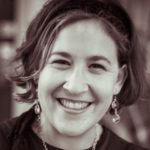Rabbi Sara Brandes

My interest in this essay is to delve more deeply in to the methods we use at Or HaLev to bring the four themes to life. Or HaLev enjoys success in ways that other Jewish organizations often do not. Our three and six-day silent Jewish meditation retreats attract the fullest spectrum of the Jewish world, Jews of all ages, with over half under the age of 35, and all affiliations. Following retreat, more than 75% of our participants report that they would like to participate in prayer(!) in the way we do on our retreats. What makes our retreats so successful?
- Or HaLev retreats are retreats. To join us, participants must step out of their hectic daily lives. So many of our current 21st century cultural norms are unhealthy and anti-social. We work ourselves to the bone, self-medicating with caffeine, sugar and prescription drugs and spend our time connecting virtually, not actually. By meeting our students on retreat, we step away from all of that. We can practice being human Jewishly, and that is very powerful.
- Or HaLev retreats are immersive. On them, we don’t just learn about Judaism, we do Judaism and we do it in rich, intentional Jewish community. At many times over the course of a retreat, our teachers will say the phrase, “Don’t take my word for it. Try it out for yourself and check out what’s true for you.” Contrary to the model of the symbolic exemplar that informs much of synagogue life, in the retreat setting, our participants do it all themselves. As a result, they are impacted by Judaism directly, not vicariously.
- Or HaLev retreats are intense. In order to join us, our participants agree to unplug and go silent for the duration of the retreat. More importantly, everything we do on an Or HaLev retreat is grounded in Jewish text and tradition and we tell our students as much. Our programming conforms to halakha and our practices are the practices of our people. We double down on authenticity. We do not offer our students entertainment or self-help, we offer deep, rich, Torah. The setting we create on retreat – intentional community, silence, vulnerability, compassion – helps our students to press beyond the fears and inhibitions that might encumber them in other settings. For example, a seeker who refuses to open the siddur in a prayer setting for fear of feeling confused and ignorant, faces those inhibitions directly with us. We help them move through their fears so that they can engage in rich Jewish practice.
- Or HaLev retreats are radically open. Unlike synagogues and other historic Jewish institutions, Or HaLev’s target market is Jewish individuals. In spending time with us, our students delve deep within their own individuality, their solitary experience of the world and their lives. Our approach resonates with the millennial allergy to labels, and instead welcomes participant just as they are. By focusing on the individual we are able to bring our value for radical pluralism to life. Our participants are ultra-orthodox, secular, Buddhist, young, old, gay, straight, etc. They represent the diversity of klal yisrael. In the retreat setting, we succeed in creating a community that can hold such diversity. In so doing, we uncover the many similarities that co-exist despite our differences and we affirm that every one has a place in our Jewish community.
As Jewish leaders, we know that Judaism is powerful. We know that it adds richness and meaning to life. But, the noise and pressures the 21st century make it very difficult to convey the power of our tradition to those who don’t already experience it that way. Or HaLev retreats open the door to this kind of rich Jewish experience.
___________________________
Rabbi Sara Brandes was ordained at JTS and is the executive director at the Or HaLev: Center for Jewish Spirituality and Meditation. A student of world religion and a certified yoga instructor, Sara is the author of Magical World: Stories, Reflections, Poems and lives with her family at Kibbutz Hanaton, a progressive, pluralistic kibbutz in Northern Israel.

